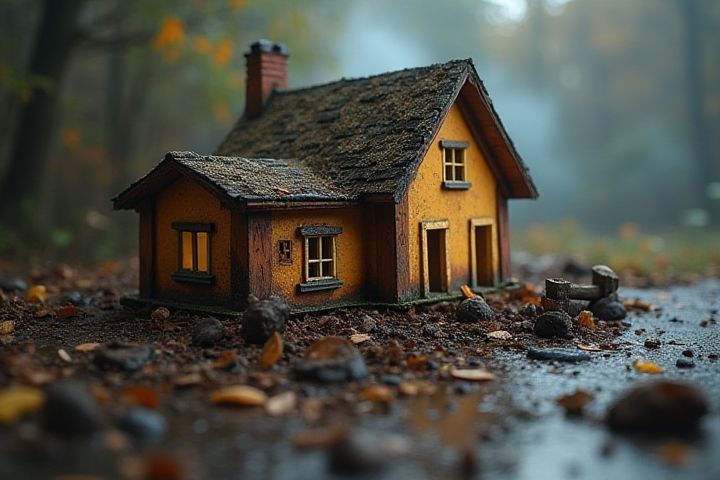
Foul odors in a house can stem from various sources, negatively impacting your living environment. Common culprits include mold and mildew, which thrive in damp areas, such as bathrooms or basements, releasing musty scents. Food waste, particularly when left to decompose in garbage bins or under furniture, creates unpleasant smells that can permeate your entire space. Pet odors, especially from unclean litter boxes or wet pet fur, can significantly diminish indoor air quality. Identifying and addressing these issues promptly will help ensure a fresh and inviting atmosphere in your home.
Which House Smells Are Bad
Mold and mildew
Mold and mildew are common indoor air quality issues that can lead to unpleasant odors, particularly in damp, poorly ventilated areas of your home. These fungi thrive in humidity and can be found in places like basements, bathrooms, and behind walls where moisture accumulates. Exposure to mold can cause various health problems, including respiratory issues, allergies, and skin irritation, making it essential to address any moldy smells promptly. To prevent mold and mildew, ensure proper ventilation, reduce humidity levels, and regularly inspect areas prone to moisture.
Rotten eggs
Rotten egg odors in your house often originate from hydrogen sulfide gas, a byproduct of decaying organic matter or a malfunctioning sewer system. If you notice this pungent smell, immediately check for issues with your plumbing, as a blocked drain or a broken sewer line may be the culprit. In homes with natural gas systems, the presence of sulfur-containing compounds is intentionally introduced to help detect leaks, so do not ignore the scent. Prompt assessment can prevent further complications and ensure the air quality in your home remains safe.
Sewage or sulfur
Sewage odors often originate from clogged drains, broken sewer lines, or poorly ventilated plumbing systems, releasing a pungent smell that can permeate your home. The presence of sulfur in the air, typically described as a rotten egg scent, may indicate problems with natural gas leaks or decaying organic matter, requiring immediate attention. Ignoring these smells can lead to health issues, including respiratory distress or other toxic consequences. To maintain a healthy environment, promptly inspect your plumbing and eliminate the sources of these unpleasant odors.
Musty or damp
Musty odors in your home typically originate from mold or mildew, often linked to excessive moisture or inadequate ventilation. This unpleasant scent can be particularly prevalent in basements or areas with poor air circulation, where humidity levels rise above 60%. Identifying and addressing the source of dampness, such as leaks or condensation, can significantly improve air quality. Regularly using dehumidifiers and ensuring proper ventilation can help maintain optimal moisture levels, preventing the development of musty smells.
Decaying food
Decaying food emits strong, unpleasant odors due to the breakdown of organic matter, often ranging from rancid to sulfuric smells. The presence of bacteria, mold, and fungi accelerates this decomposition, releasing volatile compounds like ammonia and hydrogen sulfide. These odors can permeate your home, particularly in kitchen areas, resulting in an uninviting atmosphere that can linger for days if not addressed properly. To mitigate these smells, it's crucial to regularly check your pantry and refrigerator, disposing of any expired items within 7 to 14 days to maintain a fresh living environment.
Burning or electrical smell
A burning smell in your house typically indicates overheating wires or electrical components, which can pose serious fire hazards. Common causes include frayed insulation, overloaded circuits, or malfunctioning devices, resulting in electrical arcing or short-circuiting. If you notice a burning odor, it's crucial to immediately turn off the power and unplug any affected appliances, as ignoring this warning can lead to electrical fires that threaten your safety. Regular electrical inspections every 3 to 5 years can help prevent such dangerous situations and ensure your home remains safe and odor-free.
Gas or propane
Gas or propane leaks in your house can produce an unpleasant odor, often described as a sulfuric or rotten egg scent, caused by added mercaptan for safety detection. Prolonged exposure to this odor may not only be irritating but also presents safety risks, such as potential explosions or health hazards. It's crucial to recognize that if you detect this smell, you should immediately turn off the gas supply, ventilate the area, and contact emergency services. Regular maintenance checks on gas appliances and systems can help prevent these hazardous situations and ensure your home remains safe and odor-free.
Ammonia or urine
A strong smell of ammonia in your house typically indicates the presence of urine, which can originate from pets or lingering residue in carpets and upholstery. Urine that has dried may release ammonia as it breaks down, leading to an unpleasant odor that could affect air quality. If you notice ammonia smells, it's essential to address the source; for example, deep cleaning carpets with enzymatic cleaners can effectively neutralize these odors. Regularly inspecting and cleaning your home, especially in areas where pets frequent, will help maintain a fresh and inviting environment.
Chemical or solvent
Common household chemical odors that can be unpleasant include ammonia, often found in cleaning products, and formaldehyde, typically released from pressed wood products and some fabrics. Strong solvents, such as acetone from nail polish remover and paint thinners, can contribute to a lingering, irritating smell in living spaces. Volatile organic compounds (VOCs) in air fresheners and cleaners can exacerbate air quality issues, potentially leading to health concerns. To improve indoor air quality, consider using natural alternatives or ensuring proper ventilation when using these products.
Stale cigarette smoke
Stale cigarette smoke can permeate various surfaces in your home, leaving behind an unpleasant odor that lingers for years. Carpets can absorb the toxins and odors, often requiring professional cleaning to fully remove the smell. Fabrics, such as curtains and upholstery, also trap smoke particles, making it essential to wash or replace them for a fresh environment. If you want to eliminate the stale scent, consider using air purifiers equipped with activated carbon filters, which effectively capture and neutralize smoke particles.
